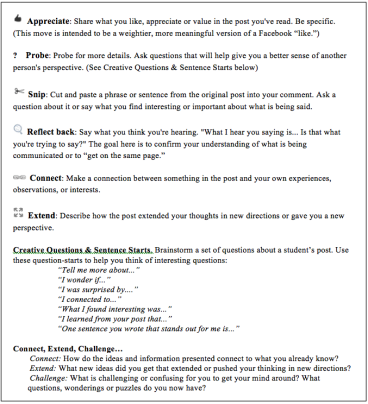Read
Teens at the Nexus of Fashion, Gaming, and Technology
A program based in Brooklyn, NY, makes learning enticing for teenagers, combining topics they might...
This post originally appeared at the Out of Eden Learn blog
How do we talk with one another in a digital age? Who do we friend, follow, and otherwise connect with? How do we share our ideas and respond to the ideas of others? And how do our online exchanges contribute to our understandings of ourselves, our communities, and our world?
As digital devices become our go-to mechanisms for communication, these questions become essential.
From the early stages of developing the Out of Eden Learn program and platform, we sought to make dialogue – especially cross-cultural dialogue – a key aspect of the learning journey. We did this for a few reasons. First, we see great learning potentials in asking youth to share perspectives, stories, and photographs of their communities with young people from other cultures. Second, we were well aware of research by Ethan Zuckerman and others which documents a tendency to “flock together” with people like ourselves online, to remain in filter bubbles or echo chambers.
In other words, the great potential for exposure to diverse perspectives online has been largely unmet.
Given our learning goals and these concerns, we sought to design an online community that intentionally placed youth in geographically, culturally, and socio-economically diverse clusters or “walking parties” as we call them. Our friends at ICON interactive designed a beautiful platform with social media features to support this aspect of the Out of Eden Learn experience. Participants are able to view and comment on the work of anyone else in their walking party. We invited them to do so with a simple plea to read and “interact” with the work posted by their fellow learners.
As our first groups of learners set off on their learning journeys last year, we were excited to see how they would engage both with the “footsteps” in our curriculum and with each another.
What we found was that many youth were excited to see the photographs and hear the perspectives of youth from other cultures. Short comments such as “cool picture” and “wow – very beautiful” were typical. It was great to see these positive exchanges. At the same time, we had hoped to see more substantive engagement.
To be sure, some did youth post more in depth, detailed responses, probing for more information or making a connection with their own experiences. Yet, on balance, the invitation to “interact” with each other wasn’t always embraced as we had hoped it would be. It became clear that we needed to do more to support deeper dialogue.
As we approached this problem space, Carrie’s research on youth’s approaches to online life provided some helpful background insights. In addition, we felt that Project Zero’s visible thinking routines could provide some practical supports. However, connecting with National Writing Project educator Chris Sloan about his work around commenting in online communities really pushed our thinking forward. Starting with our Google+ conversation, Creating Meaningful and Respectful Online Spaces, Chris and Carrie began to work together to assemble tools to promote richer dialogue in OOEL and other online venues. (See sources below).
Our new “dialogue toolkit” will be a core aspect of the learning journey for new walking parties launching this fall. In brief, the dialogue toolkit is a set of lean structures – short moves, strategies, and routines – that support thoughtful exchanges between participants in the Out of Eden Learn community. Throughout their learning journeys, we will ask students to use a range of dialogue tools to engage with the work of other young people.
Selected dialogue moves and routines are described below. (Click on box to enlarge)

In our updated learning journey, we will ask participants to practice certain tools at certain moments in their journeys. At other moments, they will choose how they’d like to engage with each other. In our updated platform, we’ve embedded the symbols associated with these dialogue tools into the comment box as a way of reminding participants of different ways they might engage with one another’s work.
We are excited to see how these tools support the Out of Eden Learn experience and student learning. Stay tuned for updates!
Interested in exploring these ideas further? Join Carrie and Chris at Project Zero’s conference for educators in San Francisco, October 10-12. In our workshop, Supporting Meaningful and Civil Youth Voices in a Global, Digital World, we will provide educators with opportunities to explore these issues, engage with these tools, and consider applications to their own practice – both as educators and participants in online communities.
Sources
See-Wonder-Connect. National Gallery of Art. Washington D.C.
Ritchhart, R., Church, M., & Morrison, K. (2011). Making Thinking Visible: How to Promote Engagement, Understanding, and Independence for All Learners. San Francisco, CA: Jossey-Bass.
Sloan, Chris. Comment as Genre. Youth Voices: A National Writing Project community. http://youthvoices.net/node/35079
Visible Thinking: http://www.visiblethinkingpz.org/VisibleThinking_html_files/ 03_ThinkingRoutines/03a_ThinkingRoutines.html
Winiecki, Donald J. (1999). Keeping the thread: Adapting conversational practice to help distance students and instructors manage discussions in an asynchronous learning network. DEOSNEWS, 9 (2), 1-14. Available: http://learningdesign.psu.edu/deos/deosnews9_2.pdf
By Carrie James and Chris Sloan
Carrie James is a co-principal investigator of the Out of Eden Learn project, Project Zero, Harvard Graduate School of Education.
Chris Sloan is an English teacher and media adviser at Judge Memorial High School and a teacher-consultant with the National Writing Project and Wasatch Range Writing Project.